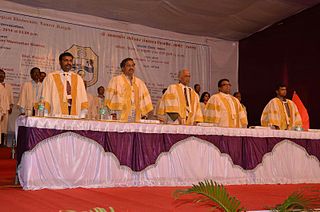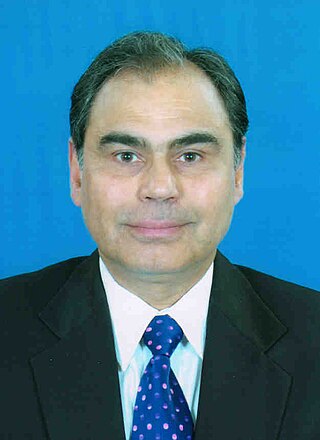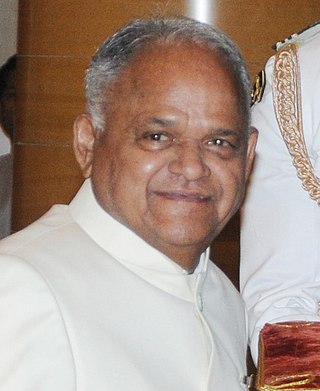Related Research Articles

Man Mohan Sharma, is an Indian chemical engineer. He was educated at Jodhpur, Mumbai, and Cambridge. At age 27, he was appointed Professor of Chemical Engineering in the Institute of Chemical Technology, Mumbai. He later went on to become the Director of UDCT, the first chemical engineering professor to do so from UDCT.

Vijay Pandurang Bhatkar is an Indian computer scientist, IT leader and educationalist. He is best known as the architect of India's national initiative in supercomputing where he led the development of Param supercomputers. He is a Padma Shri, Padma Bhushan, and Maharashtra Bhushan awardee. Indian computer magazine Dataquest placed him among the pioneers of India's IT industry. He was the founder and executive director of Centre for Development of Advanced Computing (C-DAC) and is currently working on developing exascale supercomputing for India.

Motilal Madan is an Indian biotechnology researcher, veterinarian, academic and administrator. In a career spanning over 35 years, Madan published 432 research articles and policy papers in international and national reference journals—including 226 original research papers—and pioneered research in reproductive endocrinology, embryo biotechnology, In vitro fertilisation, and cloning.

Venu Srinivasan is an Indian industrialist. He is Chairman Emeritus of TVS Motor Company, one of the leading manufacturers of two-wheelers in the world and Sundaram-Clayton Limited, a leading manufacturer of auto components in India. He also serves on the board of Tata Sons Ltd., the holding company of the conglomerate the Tata Group and TVS & Sons. He is a Director on the Central Board of Reserve Bank of India. He is also Vice Chairman of Tata Trusts. Tata Trusts holds 66% of the equity capital of Tata Sons. He was conferred the Padma Bhushan Award, the third Highest civilian award in India, in January 2020.

Pramod Tandon is an India Plant Biotechnologist and academic. He is a former Professor of Botany & Vice-Chancellor of North-Eastern Hill University (NEHU), Shillong and Chief Executive Officer of Biotech Park, Lucknow. The Government of India awarded him the fourth highest civilian honour Padma Sri in 2009, for his contributions to science.

Vijay Kumar Saraswat is an Indian scientist who formerly served as the Director General of the Defence Research and Development Organisation (DRDO) and the Chief Scientific Advisor to the Indian Minister of Defence. He retired as the Director General of the DRDO on 31 May 2003. Saraswat is presently a member of NITI Aayog, the Indian Government's apex public policy think tank and the President of Sree Chitra Tirunal Institute for Medical Sciences and Technology, Trivandrum. Saraswat is also a former Chancellor of Jawaharlal Nehru University.

Cyrus S. Poonawalla is an Indian billionaire businessman, and the chairman and managing director of the Cyrus Poonawalla Group, which includes the Serum Institute of India, an Indian biotech company which is the largest vaccine manufacturer in the world and Poonawalla Fincorp a leading NBFC in India. In 2022, he is ranked as the 4th richest person in India on Forbes India rich list with a net worth of $24.3 billion. He is ranked number 1 on the Hurun Global Healthcare Rich List 2022.
Pushpa Mittra Bhargava was an Indian scientist, writer, and administrator. He founded the Centre for Cellular and Molecular Biology, a federally funded research institute, in Hyderabad. He was outspoken and highly influential in the development of scientific temper in India, and argued that scientific rationalism needed to be cultivated as a civic duty.

Maharaj Kishan Bhan was an Indian pediatrician and clinical scientist. He received M.B.B.S. Degree (1969) from Armed Forces Medical College, Pune and M.D. Degree from Post Graduate Institute of Medical Education and Research, Chandigarh. He carried out extensive post doctoral research at All India Institute of Medical Sciences in the areas of diarrheal diseases and child nutrition with an emphasis on public health issues. He served as the president of the Jawaharlal Nehru Institute of Postgraduate Medical Education & Research (JIPMER).
Archana Sharma was a renowned Indian botanist, cytogeneticist, cell biologist, and cytotoxicologist. Her widely recognized contributions include the study of speciation in vegetatively reproducing plants, induction of cell division in adult nuclei, the cause of polyteny in differentiated tissues in plants, cytotaxonomy of flowering plants, and the effect of arsenic in water.

Vinod Prakash Sharma was an Indian malariologist and entomologist, known for his work in vector biology and bioenvironmental control of malaria. Recipient of many awards, including the Padma Shri, he was again honoured by the Government of India, in 2014, by bestowing on him the third highest civilian award, the Padma Bhushan.
Jamshed Jiji Irani, KBE was an Indian industrialist. Educated in Metallurgy, he joined British Iron and Steel Research Association. Later he joined Tata Steel from which he retired in 2007 as the Director. Later he served on the boards of various Tata group companies and others. He received the Padma Bhushan in 2007.
Sarvagya Singh Katiyar FRSC popularly known as S. S. Katiyar, was an Indian scientist specializing in enzymology, and the founder Director of Dr. Ram Manohar Lohia National Law University, Lucknow. He is a former president of the Association of Indian Universities and a former vice chancellor of Chhatrapati Shahu Ji Maharaj University, Kanpur and Chandra Shekhar Azad University of Agriculture and Technology. He was honoured by the Government of India in 2003 with Padma Shri, the fourth highest Indian civilian award, followed by Padma Bhushan, the third highest civilian award, in 2009.
Mangina Venkateswara Rao was an Indian agricultural scientist, plant breeder, and geneticist considered as one of the key figures in India’s Green Revolution. He was instrumental in increasing the productivity of wheat and oil seeds in India. He served as the Vice Chancellor of the Acharya N. G. Ranga Agricultural University, Deputy Director of the Indian Council of Agricultural Research (ICAR), and vice president of the National Academy of Agricultural Sciences. He received the Borlaug Award in 1993, and Padma Shri, India's fourth highest civilian award, in 1999.
Asis Datta is an Indian biochemist, molecular biologist and genetic engineer, known for his research on genetically modified foods and food nutritional security. He was the founding Director of the National Institute of Plant Genome Research and is credited with the discovery of genes that assist in extended preservation of fruits and vegetables. He is a recipient of the Shanti Swarup Bhatnagar Award, the highest Indian award and in the Science category, and was awarded the fourth highest civilian award of the Padma Shri, by the Government of India, in 1999. In 2008, he was included again in the Republic Day Honours list for the third highest civilian honour of the Padma Bhushan.

Virender Lal Chopra was an Indian biotechnologist, geneticist, agriculturalist and a director-general of the Indian Council of Agricultural Research (ICAR), known to have contributed to the development of wheat production in India. He was the chancellor of Central University of Kerala, a Chancellor of the Central Agricultural University, Imphal and a member of the Planning Commission of India. An elected fellow of several science academies such as Indian Academy of Sciences, Indian National Science Academy, National Academy of Agricultural Sciences, National Academy of Sciences, India, European Academy of Sciences and Arts and The World Academy of Sciences (TWAS), he was a recipient of a number of honors including Borlaug Award, FAO World Food Day Award and Om Prakash Bhasin Award. The Government of India awarded him the third highest civilian honour of the Padma Bhushan, in 1985, for his contributions to agricultural science.
Veena Tandon is an Indian parasitologist, academic and a NASI senior scientist at Biotech Park, Lucknow. She is a former professor of zoology at the North Eastern Hill University and serves as the chief instigator for the North-East India Helminth Parasite Information Database. She is known for her researches on worm infections afflicting the animals of food value and is the author of two books and several articles on parasitology.

Ganapati Dadasaheb Yadav is an Indian chemical engineer, inventor and academic, known for his research on nanomaterials, gas absorption with chemical reaction and phase transfer catalysis. He served as the vice chancellor of the Institute of Chemical Technology, Mumbai from 2009 until November 2019. He is currently the Emeritus Professor of Eminence at ICT Mumbai.

Arun Kumar Sharma, popularly known as AKS, was an Indian cytogeneticist, cell biologist, cytochemist and a former Sir Rashbehary Ghose Professor and Head of the Department of Botany at the University of Kolkata, College of Science and Technology. Considered by many as the father of Indian cytology, he headed the Centre for Advanced Study on Cell and Chromosome at the university and is known for his contributions to the studies on the physical and chemical nature of chromosomes. A Jawaharlal Nehru fellow, he is a recipient of several honors including the Om Prakash Bhasin Award and the VASVIK Industrial Research Award. The Council of Scientific and Industrial Research, the apex agency of the Government of India for scientific research, awarded him the Shanti Swarup Bhatnagar Prize for Science and Technology, one of the highest Indian science awards, in 1967, for his contributions to biological sciences. The Government of India awarded him the third highest civilian honor of the Padma Bhushan in 1983.
Krishna Ella is an Indian scientist and entrepreneur. He is the founder and Executive Chairman of Bharat Biotech. Ella and his company were responsible for developing India's own COVID-19 vaccine, Covaxin, World's 1st clinically proven conjugated Typhoid Vaccine, TypbarTCV and ROTAVAC.
References
- ↑ "Creation of DBT". Department of Biotechnology. Retrieved 30 August 2016.
- ↑ "Padma Bhushan Awardees". Government of India. Archived from the original on 13 September 2016. Retrieved 30 August 2016.
- ↑ Menon, M.G.K (2004). "Chp 2: Development of New Biology in India: Science and Relevance". In Basu, Sandip K.; Batra, Janendra K.; Salunke, Dinakar M. (eds.). Deep Roots, Open Skies: New Biology in India.
- 1 2 3 4 The Shaping of Indian Science: Presidential Addresses Vol 3: 1982-2003. Indian Science Congress Association. 2003. ISBN 9788173714344 . Retrieved 31 August 2016.
- 1 2 3 "A Biotech Pioneer and Champion". BioSpectrum India Magazine. Archived from the original on 11 September 2016. Retrieved 30 August 2016.
- 1 2 3 "Dr. Manju Sharma". Purdue University. Retrieved 1 October 2014.
- ↑ "IIAR 2012 Annual Report" (PDF). IIAR. Archived from the original (PDF) on 4 August 2016. Retrieved 31 August 2016.
- ↑ "National Conference on 'Technological Empowerment of Women'" (PDF). National Academy of Sciences, India. 11 January 2019. Retrieved 11 January 2019.
- ↑ "A Road Map for Women in Science and Technology" (PDF). National Academy of Sciences, India. 11 January 2019. Retrieved 11 January 2019.
- ↑ "Award Winners".
- 1 2 "Science and Technology Excellence" (PDF). Uttarakhand State Council for Science and Technology. Retrieved 31 August 2016.
- ↑ "Past Presidents". NASI. Retrieved 1 October 2014.
- ↑ "Past Presidents". ISCA, India. Archived from the original on 1 March 2016. Retrieved 31 August 2016.
- ↑ "G. M. Modi Award Winners". Indian Institute of Fine Arts. Retrieved 31 August 2016.
- ↑ "Purdue to award 7 honorary doctorates during spring commencement". Purdue University. Retrieved 31 August 2016.